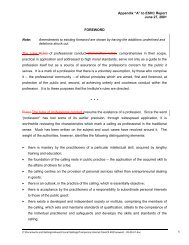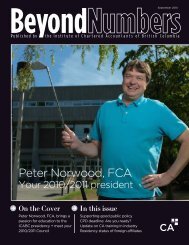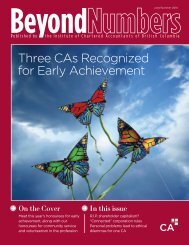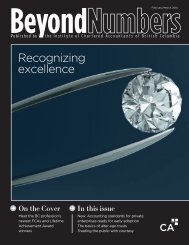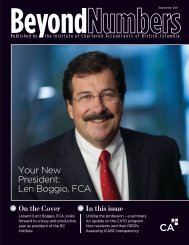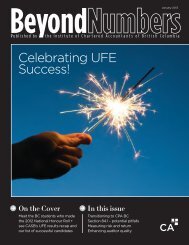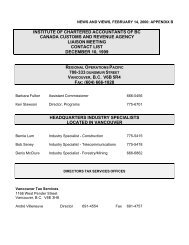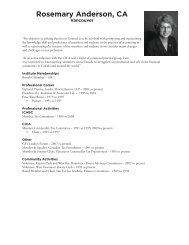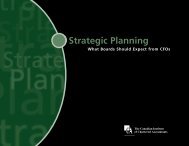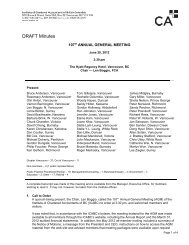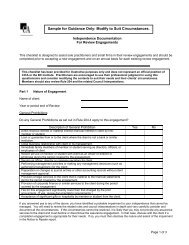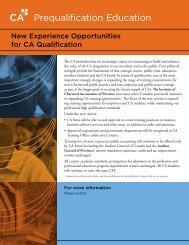ICABC Awards for Early Achievement - Institute of Chartered ...
ICABC Awards for Early Achievement - Institute of Chartered ...
ICABC Awards for Early Achievement - Institute of Chartered ...
You also want an ePaper? Increase the reach of your titles
YUMPU automatically turns print PDFs into web optimized ePapers that Google loves.
Ethical DilemmasName Game CausesTrouble <strong>for</strong> CABy Chris Utley, CADirector <strong>of</strong> EthicsFollowing the breakdown <strong>of</strong> a marriage, it’scommon <strong>for</strong> issues to arise with regardto the tax deductions claimed <strong>for</strong> dependants—especiallywhen it comes to determiningwhich parent is entitled to make a claim. Imaginehow challenging these issues can become wheneven the name <strong>of</strong> the child is under dispute.That’s precisely the kind <strong>of</strong> troublesome scenarioin which a CA named Marshall* found himself.The situationMarshall runs his own practice. His businessconsists primarily <strong>of</strong> compilation engagements, buthe also conducts a few non-pr<strong>of</strong>it organizationaudits and over 100 personal income tax returns.In 1999, Marshall took on newlyweds DonaldWilwood and Lucinda Reynolds as clients. Heprepared their income tax returns until 2006,when they announced their separation. Hesubsequently retained Donald as a client, butdropped Lucinda out <strong>of</strong> concerns regardingconflict <strong>of</strong> interest.Accordingly, Lucinda found a different accountantto prepare her 2007 return. To her surprise,this return was reassessed by the CRA in theamount <strong>of</strong> $2,385. Linda discovered she was noteligible to make a claim <strong>for</strong> her daughter, CourtneyReynolds, because her ex-husband had alreadydeducted the amount <strong>for</strong> an eligible dependanton his return. She also discovered that Donaldhad used the name “Courtney Wilwood” whenmaking his claim. Arguing that this person didnot even exist, Lucinda filed a notice <strong>of</strong> objectionwith the CRA and wrote a letter <strong>of</strong> complaint tothe <strong>Institute</strong>.What happenedIn her letter to the <strong>Institute</strong>, Lucinda accused Marshall <strong>of</strong> filing a false return <strong>for</strong> Donald <strong>for</strong> the 2007taxation year, stating that he and Donald had conjured up a fictitious child. A PCEC investigation wasauthorized.In clarifying her complaint, Lucinda explained that her daughter’s full, legal name was “CourtneyHazel Wilwood Reynolds.” Further, Lucinda claimed that while she and Donald shared joint custody<strong>of</strong> their daughter, hers was the home that had been Courtney’s primary residence since the couple’sseparation.Lucinda also told the PCEC that it had upset her when Marshall released her as a client because shebelieved this would make it easier <strong>for</strong> her ex to hide his financial in<strong>for</strong>mation. As it turned out, Donalddid prove truculent during the divorce process, playing games with financial disclosure (<strong>for</strong> example,he claimed his income was half its actual amount); moreover, he did not pay child support <strong>for</strong> one year.Lucinda told the PCEC she’d had to get a court order to: a) <strong>for</strong>ce Donald to produce financialin<strong>for</strong>mation in a timely fashion, and b) to settle the matter <strong>of</strong> child custody and support, and that she’dincurred legal fees in the process. Had Marshall not dropped her as a client, she argued, she likely wouldnot have incurred these costs; nor would she have incurred the higher accounting fees that resultedfrom hiring a new accountant who had to start from scratch.In response to these complaints, Marshall argued that confidentiality rules would have prevented himfrom disclosing any <strong>of</strong> Donald’s in<strong>for</strong>mation to Lucinda even if he had retained her as a client. Hebelieved Lucinda ought to have known this.In addition, Marshall told the PCEC that when Donald had indicated that he wanted to claim thededuction <strong>for</strong> Courtney, he’d explained to his client that only one parent could make the claim.According to Marshall, Donald understood, saying that he would speak to his ex-wife. Marshall pointedout that because he reviewed neither the court order nor the divorce documents, he had no idea thatDonald did not ultimately follow through.Marshall also told that PCEC that Donald never told him he’d received an enquiry from the CRAseeking justification <strong>for</strong> his 2007 deduction claim. As a result, he said, he thought nothing was awrywhen Donald did not claim the deduction in 2008.As to the name <strong>of</strong> the couple’s child, Marshall told the PCEC he checked the dependant in<strong>for</strong>mationon the older tax returns in his computer system and found that “Courtney Wilwood” had been thename used since 2002.Furthermore, Marshall noted that he’d prepared Donald’s 2007 tax return using only the in<strong>for</strong>mationprovided by the client. Donald, he said, had signed an agreement stating that, “the in<strong>for</strong>mation suppliedby him is, to his knowledge, correct and complete, and fully discloses all <strong>of</strong> his reporting requirementsunder the Income Tax Act.”The outcomePCEC members discussed whether Marshall had failed to exercise due care (Rule 202) and/or whetherhe had associated himself with false in<strong>for</strong>mation (Rule 205), thereby failing to maintain the reputation<strong>of</strong> the pr<strong>of</strong>ession (Rule 201.1). Ultimately, they concluded that there were no grounds to find Marshallin breach <strong>of</strong> these rules <strong>of</strong> conduct.The messageMarshall had done a number <strong>of</strong> things right to protect himself: He’d had Donald sign an engagementletter spelling out the terms <strong>of</strong> the engagement and Marshall’s responsibilities; he’d obtained Donald’swritten acknowledgement that it was Donald’s responsibility to provide in<strong>for</strong>mation <strong>for</strong> income taxpurposes; he’d refused to work <strong>for</strong> both Lucinda and Donald once the couple had separated; and he’dobserved the rules <strong>of</strong> client confidentiality.Comments or questions? Contact me at utley@ica.bc.ca.*Please note: This fictionalized account is based loosely on an actual case be<strong>for</strong>e the Pr<strong>of</strong>essional ConductEnquiry Committee (PCEC). Names and circumstances have been changed to preserve anonymity. Thecontents <strong>of</strong> this article are only intended <strong>for</strong> the general guidance <strong>of</strong> readers. The PCEC deals with each caseindividually, based on its specific facts and circumstances.38 ica.bc.ca June/Summer ’09



